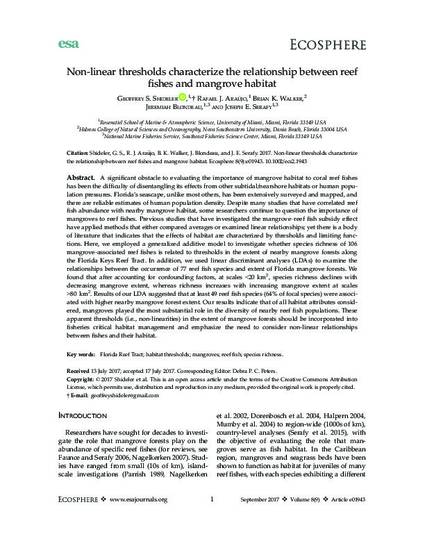
- Florida Reef Tract,
- Habitat thresholds,
- Mangroves,
- Reef fish,
- Species richness
A significant obstacle to evaluating the importance of mangrove habitat to coral reef fishes has been the difficulty of disentangling its effects from other subtidal/nearshore habitats or human population pressures. Florida's seascape, unlike most others, has been extensively surveyed and mapped, and there are reliable estimates of human population density. Despite many studies that have correlated reef fish abundance with nearby mangrove habitat, some researchers continue to question the importance of mangroves to reef fishes. Previous studies that have investigated the mangrove–reef fish subsidy effect have applied methods that either compared averages or examined linear relationships; yet there is a body of literature that indicates that the effects of habitat are characterized by thresholds and limiting functions. Here, we employed a generalized additive model to investigate whether species richness of 106 mangrove‐associated reef fishes is related to thresholds in the extent of nearby mangrove forests along the Florida Keys Reef Tract. In addition, we used linear discriminant analyses (LDAs) to examine the relationships between the occurrence of 77 reef fish species and extent of Florida mangrove forests. We found that after accounting for confounding factors, at scales <20 km2, species richness declines with decreasing mangrove extent, whereas richness increases with increasing mangrove extent at scales >80 km2. Results of our LDA suggested that at least 49 reef fish species (64% of focal species) were associated with higher nearby mangrove forest extent. Our results indicate that of all habitat attributes considered, mangroves played the most substantial role in the diversity of nearby reef fish populations. These apparent thresholds (i.e., non‐linearities) in the extent of mangrove forests should be incorporated into fisheries critical habitat management and emphasize the need to consider non‐linear relationships between fishes and their habitat.
Available at: http://works.bepress.com/brian_k_walker/86/

©2017 Shideler et al. This is an open access article under the terms of the Creative Commons Attribution License, which permits use, distribution and reproduction in any medium, provided the original work is properly cited.